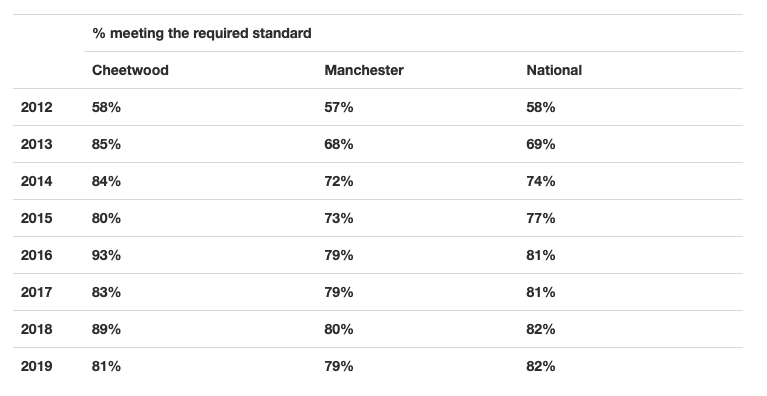Phonics Screening in Y1 and Y2
Due to school closures during the Covid 19 pandemic, statutory testing in primary schools was suspended in 2019-2020, so Cheetwood’s most recent externally validated data is from the academic year 2018-2019. This data is summarised below.
Since 2012, in the month of June in Y1, all pupils undertake the phonics screening check. Pupils are asked to read a number of decodable words, some of which are real and some of which are ‘nonsense’ words. The class teacher administers the test on a one to one basis. Pupils who do not reach the required level in the check in Y1 retake the check the following June when they are in Y2.

Cheetwood has consistently outperformed the Manchester and national averages over the past few years and was once again ahead of Manchester this year. Attainment fell just below national, as this year three pupils were not able to access the test: a pupil with an EHCP and two international new arrivals. With these pupils taken out of the data, the pass rate was 91%.
The teaching of phonics over time is good, as 86% of pupils that have been at Cheetwood since nursery passed the phonics screening.
Internal Data 2019-2020
Cheetwood uses the Target Tracker assessment tool to track progress and attainment and the last data call prior to school closure was at the end of Spring 1. At this time there was strong evidence that there was above expected progress in reading, writing and maths across the majority of cohorts resulting in an increase in the percentage of pupils meeting age related expectations. Progress for groups of vulnerable learners was especially strong indicating targeted teaching and specialist intervention was helping to close the gap for these pupils.
Phonics: Expected progress in Y1 reading with the cohort on track to be in line with national expectations in phonics
Transience throughout the school continued to impact on the percentage of pupils meeting age related expectations. However, tracking data for the ‘Ever Cheetwood’ group of pupils (those that have been at Cheetwood continuously since Reception) indicates that in the majority of subjects and cohorts the percentage of pupils meeting age related expectations is above national average. This demonstrates the impact of high quality teaching over time.